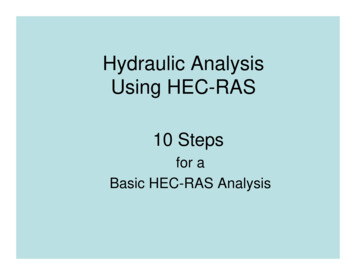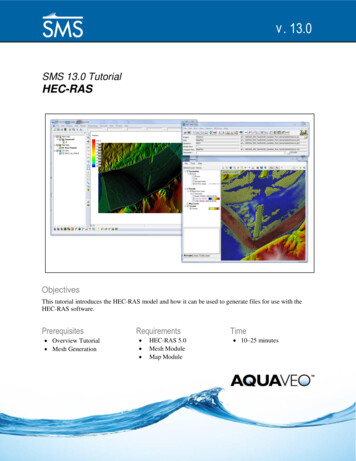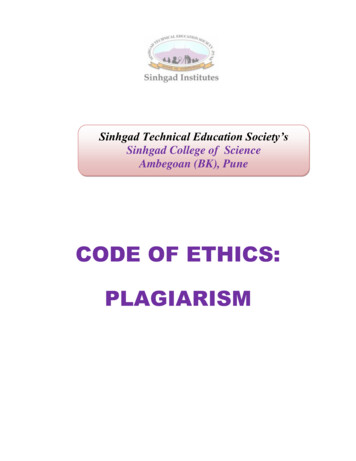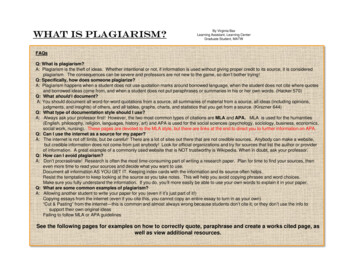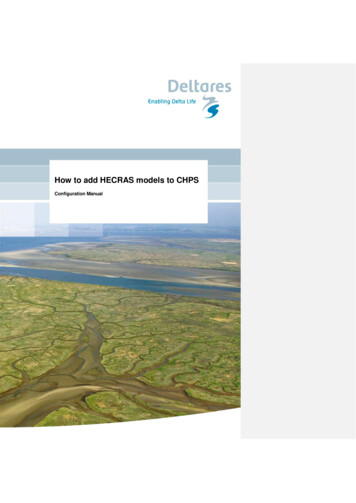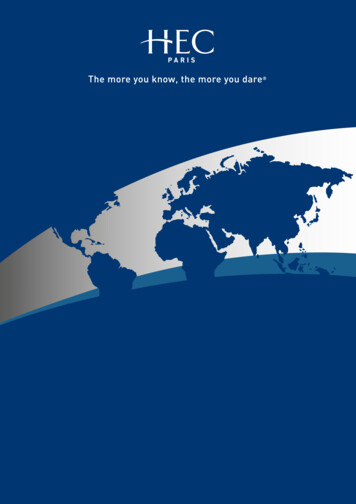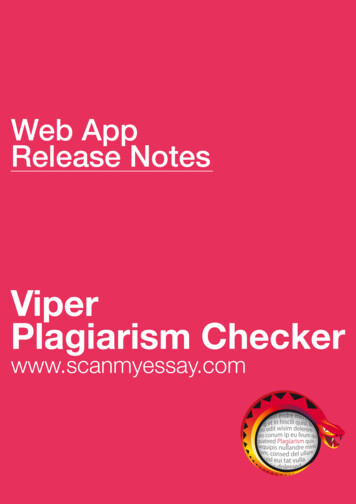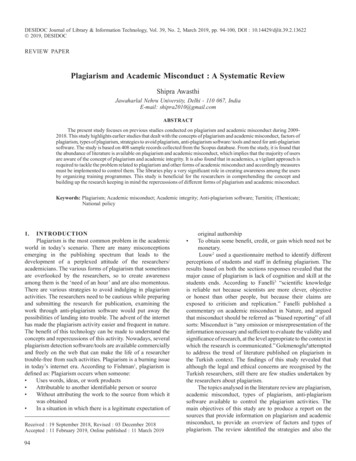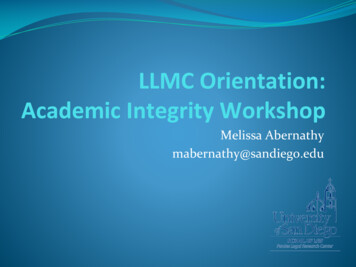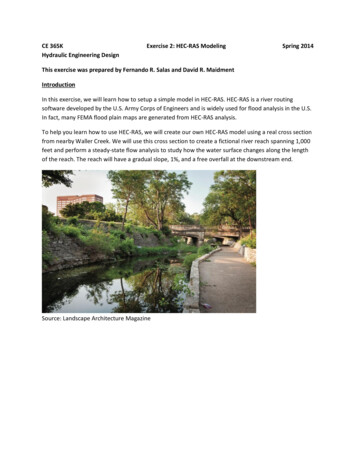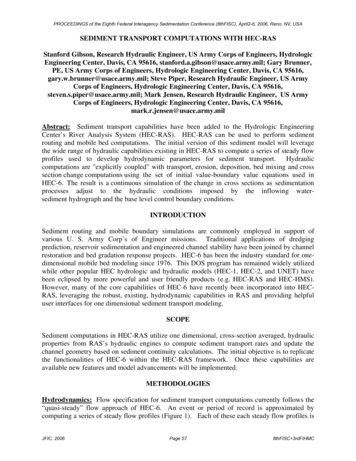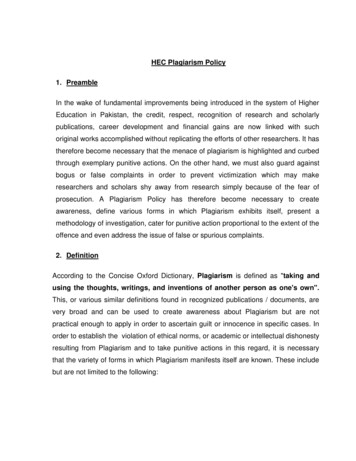
Transcription
HEC Plagiarism Policy1. PreambleIn the wake of fundamental improvements being introduced in the system of HigherEducation in Pakistan, the credit, respect, recognition of research and scholarlypublications, career development and financial gains are now linked with suchoriginal works accomplished without replicating the efforts of other researchers. It hastherefore become necessary that the menace of plagiarism is highlighted and curbedthrough exemplary punitive actions. On the other hand, we must also guard againstbogus or false complaints in order to prevent victimization which may makeresearchers and scholars shy away from research simply because of the fear ofprosecution. A Plagiarism Policy has therefore become necessary to createawareness, define various forms in which Plagiarism exhibits itself, present amethodology of investigation, cater for punitive action proportional to the extent of theoffence and even address the issue of false or spurious complaints.2. DefinitionAccording to the Concise Oxford Dictionary, Plagiarism is defined as "taking andusing the thoughts, writings, and inventions of another person as one's own".This, or various similar definitions found in recognized publications / documents, arevery broad and can be used to create awareness about Plagiarism but are notpractical enough to apply in order to ascertain guilt or innocence in specific cases. Inorder to establish the violation of ethical norms, or academic or intellectual dishonestyresulting from Plagiarism and to take punitive actions in this regard, it is necessarythat the variety of forms in which Plagiarism manifests itself are known. These includebut are not limited to the following:
“Verbatim copying, near-verbatim copying, or purposely paraphrasingportions of another author's paper or unpublished report without citingthe exact reference.Copying elements of another author's paper, such as equations orillustrations that are not common knowledge, or copying or purposelyparaphrasing sentences without citing the source.Verbatim copying portions of another author's paper or from reports byciting but not clearly differentiating what text has been copied (e.g. notapplying quotation marks correctly) and /or not citing the sourcecorrectly” [1]."The unacknowledged use of computer programs, mathematical /computer models / algorithms, computer software in all forms, macros,spreadsheets, web pages, databases, mathematical deviations andcalculations, designs / models / displays of any sort, diagrams, graphs,tables, drawings, works of art of any sort, fine art pieces or artifacts,digital images, computer-aided design drawings, GIS files, photographs,maps, music / composition of any sort, posters, presentations andtracing." [2]"Self-plagiarism, that is, the verbatim or near-verbatim re-use ofsignificant portions of one's own copyrighted work without citing theoriginal source." [1]3.Explanation from Wikipedia, the free encyclopediaWikipedia, the free encyclopedia on the web describes and explains Plagiarismas "the unauthorized use or close imitation of the language and thoughts of anotherauthor and the representation of them as one's own original work. Unlike cases offorgery, in which the authenticity of the writing, document, or some other kind ofobject itself is in question, plagiarism is concerned with the issue of false attribution.Within academia, plagiarism by students, professors, or researchers is considered
academic dishonesty or academic fraud and offenders are subject to academiccensure. In journalism, plagiarism is considered a breach of journalistic ethics, andreporters caught plagiarizing typically face disciplinary measures ranging fromsuspension to termination. While plagiarism in scholarship and journalism has acenturies-old history, the development of the Internet, where articles appear aselectronic text, has made the physical act of copying the work of others much easier.Plagiarism is different from copyright infringement. While both terms may apply to aparticular act, they emphasize different aspects of the transgression. Copyrightinfringement is a violation of the rights of the copyright holder, which involves the lossof income and artistic control of the material when it is used without the copyrightholder's consent. On the other hand, plagiarism is concerned with the unearnedincrement to the plagiarizing author's reputation. In the academic world, plagiarismby students is a very serious academic offense which can result in punishments suchas a failing grade on the particular assignment (typically at the high school level), or afailing grade for the course (typically at the college or university level). For cases ofrepeated plagiarism, or for cases where a student has committed a severe type ofplagiarism (e.g. copying an entire article and submitting it as his / her own work), astudent may be suspended or expelled, and any academic degrees or awards may berevoked. For professors and researchers, who are required to act as role models fortheir students, plagiarism is a very serious offence, and is punishable by sanctionsranging from suspension to termination, along with the loss of credibility and integrity.Charges of plagiarism against students, faculty members and staff are typically heardby internal disciplinary committees, which students and faculty members have agreedto be bound by." [3]Wikipedia also describes Self-plagiarism as "the re-use of significant, identical, ornearly identical portions of one’s own work without acknowledging that one is doing soor without citing the original work. Typically, high public-interest texts are not a subjectof self-plagiarism; however, the authors should not violate copyright where applicable."Public-interest texts" include such material as social, professional, and culturalopinions usually published in newspapers and magazines." [3]
4.Aim: The aim of this policy is to apprise students, teachers, researchers andstaff about Plagiarism and how it can be avoided. It is also aimed at discouragingPlagiarism by regulating and authorising punitive actions against those found guilty ofthe act of Plagiarism.5.Applicability:The policy is applicable to students, teachers, researchersand staff of all institutions and organizations in Pakistan who are involved in writing orpublishing their work. In this context a "Student" is a person who, on the date ofsubmission of his / her paper / work is a registered student of any University or DegreeAwarding Institution recognized by Higher Education Commission (HEC). "Teachersand Researchers" include faculty members or equivalent of the University /Organization or/of a constituent or affiliated college or researchers of an organizationand such other persons as may be declared to be so by regulations. “Staff” is anyemployee of an organization involved in writing and publishing his / her work.Any person listing his CV on the website or any current publication orapplying for any benefit on the basis of published or presented work that isplagiarized will be liable to be punished as per prescribed rules.6.Responsibility of the Institutions & Organizations: All institutions andorganizations are responsible to apprise their students, teachers, researchers andstaff of the definition, implications and resulting punishments in case, after dueinvestigation, they are found guilty of plagiarism. The institutions / organizations mustacquaint their students, teachers, researchers and staff with this policy and ensurethat they are fully aware that all authors are deemed to be individually and collectivelyresponsible for the contents of papers published by Journals / Publishers etc. Hence,it is the responsibility of each author, including the coauthors, to ensure that paperssubmitted for publication should attain the highest ethical standards with respect toplagiarism. To facilitate the institutions / organizations in creating awareness aboutPlagiarism, a modified version of "Little Book of Plagiarism", a publication of LeedsMetropolitan University is appended as "Annexure" to this policy. Any University orDegree Awarding Institution which does not adopt and implement this policy will haveits degree derecognized by HEC.
7.Reporting: To inform HEC or respective Universities / Organizations of allegedplagiarism, a complaint is to be made by email, post, fax or other means to HECQuality Assurance Division or respective Universities / Organizations. In case oflodging a complaint in the form of a letter, copy may be sent to HEC. The followinginformation is to be provided:a) “Citation of the original paper or document or idea which wasplagiarized, (paper title, author(s), publication title, month and year ofpublication if available and the journal, in which published, with details).If the original paper is unpublished (e.g. an institutional technical report,an on-line paper), the complainant is to provide as much information aspossible to ensure authenticity of the claim.b) The citation of the alleged plagiarizing paper (paper title, author(s),publication title, month and year of publication if available and the journalwith details in which published). If the paper is unpublished (e.g. aninstitutional technical report, an on-line paper), the complainant is toprovide as much information as possible to ensure proper investigation.c) Copies of both papers if possible.d) Any other information that would help HEC or respective Universities /Organizations to efficiently resolve the claim.” [1]e) Name, designation, organization, address, e-mail address and telephonenumber of the complainant.Investigation:8.Upon receipt of an allegation of Plagiarism, the HEC Quality AssuranceDivision will request the respective Vice Chancellor / Rector / Head of theOrganization to carry out investigation. The complaints received through HEC ordirectly by a University / Organization will be dealt with by the Universities /Organizations according to the procedures given below. The Vice Chancellor / Rector/ Head of the Organization will have the discretion of not taking any action on
anonymous complaints. For investigation of Plagiarism cases, the Vice Chancellor /Rector / Head of Organization will have an obligation to:a) Constitute a “Plagiarism Standing Committee” consisting of 3 seniorfaculty members, a subject specialist in that particular field is to be coopted, a senior student (only if a student is being investigated upon)and a nominee of the HEC.The seniority of the members of “PlagiarismStanding Committee” should be of a level keeping in view the seniorityof the individual being investigated upon and the nature and gravity ofthe offence.b) Provide a guideline, prepared by HEC for the functioning of the"Plagiarism Standing Committee", to all members of the Committee.c) Provide clear terms of reference to the “Plagiarism StandingCommittee” for their investigation.d) The members of the “Plagiarism Standing Committee” are to sign aconfidentiality statement that during the investigation they will, underno circumstances, disclose any individual author's name, paper titles,referees, or any other personal or specific information concerning theplagiarism complaint under investigation, nor shall they reveal thenames of the committee members.e) Provide opportunity to the author / authors under investigation to justifythe originality of their concepts and research work. Similar opportunitywill also be provided to the author whose paper is deemed to havebeen Plagiarized and / or the complainant, to justify the complaint.f) Provide every opportunity to the “Plagiarism Standing Committee” touse all foreseeable means to investigate the plagiarism claim.9.The Plagiarism Standing Committee shall then conduct the investigation.Depending on the details of the claim, the investigation may include, but may not belimited to, any or all of the following steps:
a) Manual and / or automated tests for content similarity [1].b) Determination of the extent and quantum of significant materialplagiarized.c) Soliciting comments to the claim, from the Editor-in-Chief (of a journal) orProgram Chair (of conference proceedings) and referees of either orboth papers.d) Consultation with legal counsel. [1]e) Consult / contact witnesses and record statements there-of if sorequired.f) Consult / contact present and / or past employers of the authors.10.The “Plagiarism Standing Committee” will submit its report with clear cutfindings and recommendations to the Vice Chancellor / Rector / Head of theOrganization within a specified period not exceeding sixty days. The Vice Chancellor /Rector / Head of the Organization will have the discretion to implement therecommendations after approval through the statutory process and take punitiveaction against the offender as per penalties prescribed under this policy or to forwardthe report to HEC or his / her parent organization for further action if outside theirpurview / jurisdiction.Penalties for Plagiarism11.Plagiarism is an intellectual crime. As such the penalties for plagiarism shouldnot only take into account the severity and recurrence of the offence, but also theintellectual standing of the offender. This entails a gradual increase in punitive actionwith minimum punishment for a first time offence by a student who copies a homework assignment to a maximum punishment for a teacher/researcher/staff whoattempts to present / publish, or actually presents / publishes plagiarized material; ashis own, in a conference / journal. Therefore, the punishments for Plagiarism havebeen divided into two separate categories, i.e those for "Teachers, Researchers and
Staff" and those for the "Students". The groups have already been defined in para 5above.(a)Penalties for Teachers, Researchers and Staff:When an act ofplagiarism, as described earlier in paras 2 and 3, is found to have occurred, the"Plagiarism Standing Committee" in its recommendations, DEPENDING UPONTHE SERIOUSNESS OF THE PROVEN OFFENCE, will advise the CompetentAuthority of the Organization, to take any one or a combination of the followingdisciplinary action(s) against the teacher, researcher and / or staff found guiltyof the offence:(i) Major Penalty:In cases where most of the paper (or key results) have been exactlycopied from any published work of other people without giving thereference to the original work, then (a) a major penalty of dismissal fromservice needs to be prescribed, along with (b) the offender may be“Black Listed” and may NOT be eligible for employment in any academic/ research organization, and (c) the notification of “Black Listing” of theauthor(s) may be published in the print media or may be publicized ondifferent websites at the discretion of the Vice-Chancellor / Rector / Headof the organization.(ii) Moderate Penalty:In case where some paragraphs including some key results have beencopied without citation, then a moderate penalty involving any one orboth of the following needs to be imposed (a) demotion to the next lowergrade, (b) the notification of “Black Listing” of the author(s) which may bepublished in the print media or may be publicized on different websites atthe discretion of the Vice-Chancellor / Rector / Head of the organization.(iii) Minor Penalty:
In case a few paragraphs have been copied from an external sourcewithout giving reference of that work, then minor penalties need to beprescribed for a specified period involving any one or more of thefollowing: (a) warning, (b) freezing of all research grants, (c) thepromotions/annual increments of the offender may be stopped, for aspecified period and (d) HEC or the University / Organization may debarthe offender from sponsorship of research funding, travel grant,supervision of Ph.D. students, scholarship, fellowship or any otherfunded program for a period as deemed appropriate by the “PlagiarismStanding Committee”.(b)Students:When an act of plagiarism, as described earlier in paras 2and 3, is found to have occurred, the "Plagiarism Standing Committee" in itsrecommendations, DEPENDING UPON THE SERIOUSNESS OF THEPROVEN OFFENCE, will advise the Vice Chancellor / Head of theOrganization, to take any one or a combination of the following disciplinaryaction(s) against the student(s) found guilty of the offence:(i) In the case of thesis the responsibility of plagiarism will be of the studentand not of the supervisor or members of the Supervisory Committee.(ii) The offender may be expelled/ rusticated from the University and fromjoining any institution of Higher Education in Pakistan for a period asdeemed appropriate by the "Plagiarism Standing Committee”. A noticemay be circulated among all academic institutions and researchorganization to this effect.(iii) The offender may be relegated to a lower class.(iv) The offender may be given a failure grade in the subject.(v) The offender may be fined an amount as deemed appropriate.
(vi) The offender may be given a written warning if the offence is minor andis committed for the first time.(vii) The degree of a student may be withdrawn if AT ANY TIME it is proventhat he or she has presented Plagiarized work in his / her MS, MPhil orPhD dissertation if the extent of plagiarism comes under the category ofmajor penalty as conveyed in Para 11(a-1).(viii) The notification of the plagiarism by the author(s) may be published inthe print media or may be publicized on different websites at thediscretion of the Vice Chancellor / Rector / Head of the Organization.(ix) HEC or the University / Organization may debar the offender fromsponsorship of research funding, travel grant, scholarship, fellowship orany other funded program for a period as deemed appropriate by the"Plagiarism Standing Committee".(x) Any other penalty deemed fit by the “Plagiarism Standing Committee”.(c)Co-Authors/Declarations1.Provided that a co-author has listed a paper in his/her resumeand applied for a benefit forthwith, any co-author is deemed to beequally responsible for any plagiarism committed in a publishedpaper presented to or published in a journal or presented at aconference.2.All Journals in Pakistan must require ALL authors to sign adeclaration that the material presented in the creative work is notplagiarized (Sample Attached)12.Additional Actions Required:In addition to the above punishments, thefollowing additional common actions must be taken if the offence of Plagiarism isestablished:
a) If the plagiarized paper is accessible on the web page its access will beremoved. The paper itself will be kept in the database for future researchor legal purposes.b) The author(s) will be asked to write a formal letter of apology to theauthors of the Original paper that was plagiarized, including anadmission of plagiarism. Should the author(s) refuse to comply thenadditional punishments as deemed fit may be recommended by the"Plagiarism Standing Committee.c) If the paper is submitted but not published yet, the paper will be rejectedby the Editor-in-Chief or the Program Chair without further revisions andwithout any further plagiarism investigation conducted.[1]However, Warning may be issued to the author/ co-author.13.Appeal:As the penalties are severe, the affected person(s) will have theright to appeal to the Chairman HEC / Vice Chancellor / Rector / Head of theOrganization for a review of the findings or may submit a mercy petition within 30 daysfrom the date of notification. Such appeals / petitions will be disposed off within 60days of receipt, by following the laid down procedures regarding such appeals.14.Penalty for Wrong Reporting / False Allegation:If the case of Plagiarismis not proved and it is confirmed that a false allegation was lodged, the ViceChancellor / Rector / Head of the Organization will inform the complainant’sOrganization and will recommend disciplinary action against the complainant, to betaken by his / her parent organization.References
[1]“ACM (Association of Computing Machinery) Policy on 0policy.html)[2]“Academic Integrity Statement: Appendix1” (University of SouthamptonCalendar part8a.html)[3]“Plagiarism From Wikipedia, the free arism).
(Sample)HIGHER EDUCATION COMMISSION OF PAKISTAN(Monograph & Textbook Writing Scheme)Monograph / Textbook Proposal Submission Undertaking*Corresponding Author(s) name:Corresponding Author(s) Address:Title of Work:The Higher Education Commission (Publisher) and the Monograph/Textbook Proposal Author (Authors if a multiauthored Work) agree as the following:1.The Monograph/Book will contain the original Work of author(s).2.It will not violate copyright or intellectual property right of any person or entity.3.It will not contain previously published material in whole or in part for which permission from the concernedparties has not been secured.4.The author(s) recognize that if any material submitted for consideration to the HEC is found to beplagiarized, then the HEC may bar the author(s) from participating in all HEC Programs and public notice tothe fact maybe issued in print as well as electronic media. The HEC reserves the right to recover all amountsspent on evaluation/publication etc., and also may take any other action deemed necessary to serve asdeterrence against plagiarism.5.The author(s) shall indemnify and hold the Publisher harmless against loss or expenses arising from breachof any such warranties.6.In consideration of the HEC’s agreement to publish the Work, the author(s) hereby grants HEC a nonexclusive, royalty-free license to print, publish, reproduce or distribute the Work throughout the world by allmeans of expression, including electronic format. The author(s) further grants HEC the right to use theauthor’s name in association with the Work in published form and in promotional materials.7.The copyrights are duly reserved by Higher Education Commission of Pakistan.All authors are requested to sign this form. If not signed by all authors, the corresponding author acknowledgesthat s/he is signing on behalf of all the authors and with their authorization. Faxed signatures and multiple formsare acceptable provided the corresponding author collates all the material and submits in one batch.Author Signature: Name:Date:Author Signature: Name: Date:Author Signature: Name: Date:Publisher Signature: Name:Date:* Similar Schemes could be developed for authors or thesis etc
academic dishonesty or academic fraud and offenders are subject to academic censure. In journalism, plagiarism is considered a breach of journalistic ethics, and reporters caught plagiarizing typically face disciplinary measures ranging from suspension to termination.
